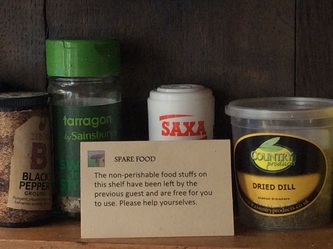
In the cottage we have had a similar problem. Many guests leave small amounts of excess food they don;t need or want to take home. If it is perishable we try and use it ourselves. But if it is non-perishable we have taken to leaving it on a shelf in the cottage labelled for further guests to use. So salt, pepper and herbs, condiments, and teas and sugar. That sort of thing. All good.
The conundrum comes with the provenance of the food stuffs. We obviously like to promote that everything we provide in the cottage comes from local, ethical and ideally organic sources. But the bits and bobs left are often not so carefully selected. And that is fair enough, we're not trying to be green police, making people feel awkward or guilty. We prefer the subtle approach of 'by example'. A recent example was some body wash left in the bathroom; a good but not ethical brand. We would not use it ourselves, and body-wash is not something we normally provide as part of the self-catering cottage deal. Should we throw it away which is a waste given that it has been produced and is perfectly viable? Or should we leave it for guests to use if they have, for example, forgotten some shower gel of their own?
We have chosen to leave it there, as we do with the condiments in the kitchen which are not the sort we'd normally buy or supply. In doing so we risk people seeing us as lax in our green standards, not practising what we (gently) preach - we cannot put signs everywhere explaining what is, or is not, 'left-over'. We hope the risk is small and people will understand what we are doing and why.
Ultimately another example that trying to be green, sustainable and ethical, is never as black and white as we'd all like to think. Or should that be 'green and white'.

 RSS Feed
RSS Feed
